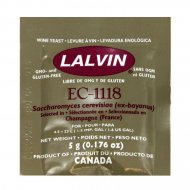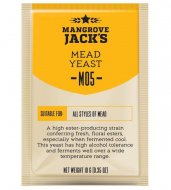Sign up to the Brew Mart newsletter for the latest news, offers & more
Please note that Brew Mart will be closed on Saturday, 5th July, AND Saturday, 12th July. Thank you.

Mead Yeast
Mead is a beverage produced by fermenting honey with water and occasionally with various spices, fruits, hops, or grains.
The alcohol content can range significantly from about 3.5% ABV to 20% ABV.
Mead's character is that most of the beverage's fermentable sugar comes from honey.
Choosing the suitable mead yeast does make a lot of difference to the taste.
Yeast is one of the few ingredients that make up a mead after using honey and water, so choosing the suitable yeast for your Mead can be the difference between a mead that is alright and a fantastic one.
Mead takes a reasonably long time to brew, so choosing the right ingredients is more important when you think of investing time.
Choosing The Right Yeast For Your Mead
Multiple different types of drinks fall under the mead category.
Mead may be carbonated, still, or naturally sparkling; dry, sweet or semi-sweet.
Each class will need some thought to ensure you are picking the correct yeast.
Brewers will want to ensure the attenuation they are getting will be suitable for the finished product.
If you wish to produce a dry mead, then a low attenuating yeast will not be the right choice.
Meads can range from having lower ABV to big, full-bodied sack meads with lots in between.
The primary things you need to consider when using a mead yeast is:
Alcohol tolerance:
The tolerance of the mead yeast needs to be capable of reaching the alcohol content of the finished beverage. If not, the yeast will stop working before the end of fermentation. Not working until finishing fermentation will leave you with a very sweet mead.
Ideal temperature range:
All yeast strains have a preferred temperature range. Knowing the range will result in the preferred flavour and optimum fermentation. Ensuring the yeast you choose can ferment in this range will significantly improve the finished Mead.
What Are The Best Mead Yeasts?
To a certain extent, any brewer or winemaker yeast can turn honey into Mead.
Lalvin EC-1118:
A natural workhorse yeast that will tear through fermentation even in less than ideal conditions. This yeast has one of the broadest temperature ranges and will be happy in cool or hot conditions. It is perfect for dry meads and fermenting nearly all the sugars available. This yeast strain is prevalent because it is a natural fit with meads requirements.
- Alcohol tolerance: up to 18% ABV
- Temperature range of 7°C – 35°C (45°F-95°F)
Mangrove jacks M05 yeast
Mangrove Jacks Mead yeast is a high ester-producing yeast strain. It produces fresh, floral esters, especially when fermented cool.
This M05 yeast has high alcohol tolerance and ferments well over a wide temperature range.
Suitable for all styles of Mead.
Attenuation: Very High (95 - 100%)
Flocculation: High
Usage Directions: Can be sprinkled directly on up to 23 L (6 US Gal) of wort. However, it benefits from mixing with a little lukewarm water before adding to the wort.
The yeast ferment at 15-30 degrees C (59-86 degrees F) for best results.
Storage Recommendations: Store in the fridge.
AROMA CHARACTERISTICS:
This strain promotes fresh, floral aromas through high ester production, especially at cooler temperatures.
FLAVOUR/MOUTHFEEL CHARACTERISTICS:
Meads fermented with Mangrove Jacks M05 will finish dry and be relatively full-bodied with good complexity and a fresh, floral character.
HIGHER ALCOHOL BEERS:
This strain has high alcohol tolerance, up to 18% ABV.
For higher alcohol meads, ferment cooler; below 77°F (25°C).
Although those yeast listed above are more dedicated mead yeasts, any wine yeast will be capable of producing a decent mead, and there are quite a few wine yeasts available in both dry and liquid forms.















